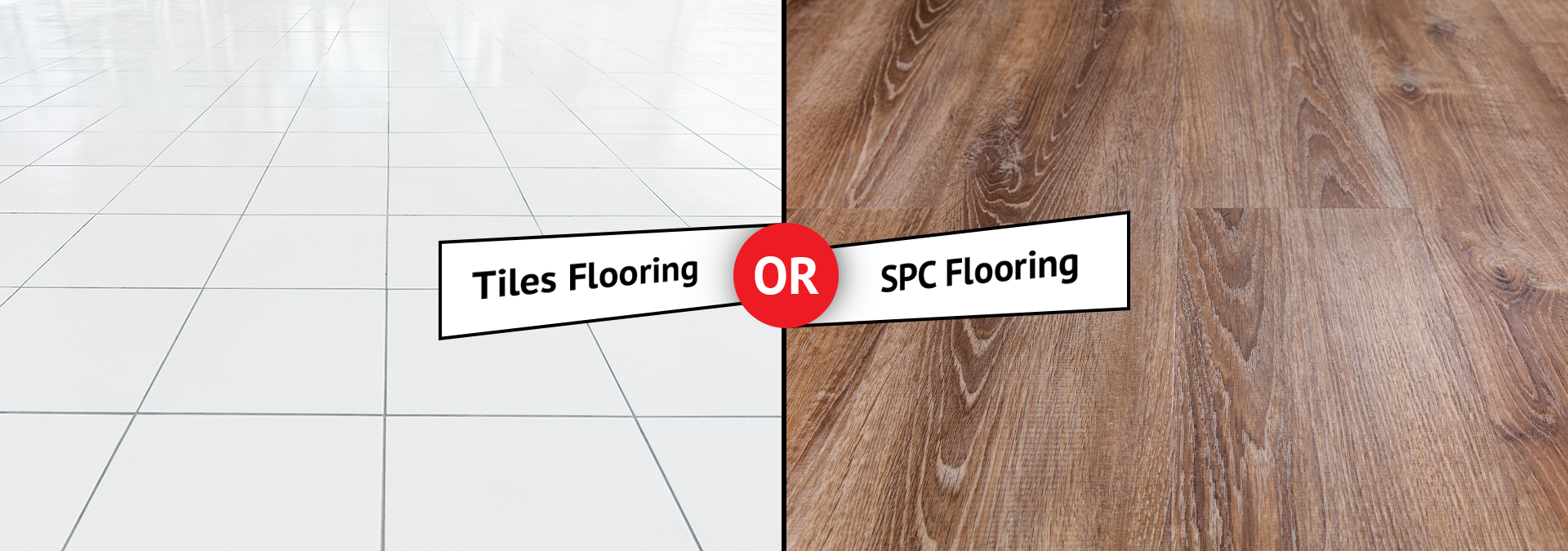Einführung
Bodenbeläge spielen bei jedem Bau- oder Renovierungsprojekt eine entscheidende Rolle und beeinflussen maßgeblich den Ton, die Atmosphäre und die Funktionalität von Innenräumen. Die Wahl des richtigen Bodenbelagsmaterials ist entscheidend, da es nicht nur die Ästhetik, sondern auch die Haltbarkeit und die Gesamtkosten eines Projekts beeinflusst. Bei Guangzhou Sourcing, sind wir uns der Komplexität bewusst, die mit der Auswahl der beste flooring option für Ihre Anforderungen verbunden ist.
Dieser Leitfaden konzentriert sich auf zwei beliebte Bodenbeläge: Fliesen und SPC-Böden (Stone Plastic Composite). Beide bieten einzigartige Vorteile und Herausforderungen, von der Gestaltungsflexibilität und den Kosten bis hin zu den Installations- und Wartungsanforderungen. Fliesen, die für ihre Haltbarkeit und endlosen Gestaltungsmöglichkeiten bekannt sind, sind eine zeitlose Wahl für viele Räume, während SPC-Böden mit ihren wasserabweisenden Eigenschaften, ihrer einfachen Installation und ihrer Widerstandsfähigkeit in stark frequentierten Bereichen eine moderne Alternative darstellen.
Unser Ziel ist es, Ihnen umfassende Einblicke zu geben, die Ihnen helfen, eine fundierte Entscheidung zu treffen, wobei sowohl die funktionalen als auch die ästhetischen Aspekte jedes Materials berücksichtigt werden. Wenn Sie die Stärken und Grenzen von Fliesen und SPC-Bodenbelägen verstehen, können Sie die ideale Lösung auswählen, die den spezifischen Anforderungen und dem Budget Ihres Projekts entspricht. Als führendes Beschaffungsunternehmen in China ist Guangzhou Sourcing bestrebt, Sie durch die Komplexität der Bodenbelagsauswahl zu führen und sicherzustellen, dass Sie das beste Ergebnis für Ihr Bau- oder Renovierungsprojekt erzielen.
Die Bedeutung von Bodenbelägen in Bauprojekten
1.1 Die Rolle des Bodenbelags: Bodenbeläge erfüllen mehr als nur einen funktionalen Zweck; sie spielen eine entscheidende Rolle für den Charakter und die Atmosphäre eines jeden Raums. In Wohnbereichen tragen Bodenbeläge dazu bei, eine warme, einladende Umgebung zu schaffen, die den persönlichen Stil widerspiegelt. In gewerblichen Bereichen wie Büros, Restaurants oder Hotels kann die Wahl des Bodenbelags das Image der Marke und das Kundenerlebnis beeinflussen. Ob für Wohn-, Gewerbe- oder Gaststättenprojekte – die Auswahl des Bodenbelagsmaterials ist entscheidend, um die gewünschten ästhetischen und funktionalen Ergebnisse zu erzielen.
1.2 Kostenüberlegungen: Bodenbeläge können einen erheblichen Teil des Gesamtbudgets eines Projekts ausmachen. Daher ist es wichtig, die mit verschiedenen Materialien verbundenen Kosten zu kennen, einschließlich des Anschaffungspreises, der Installationskosten und der langfristigen Wartungskosten. Die Bewertung der finanziellen Auswirkungen jeder Bodenbelagsoption hilft sicherzustellen, dass das ausgewählte Material im Laufe der Zeit den besten Wert bietet und die Anschaffungskosten mit Langlebigkeit und Haltbarkeit in Einklang bringt.

Fliesen vs. SPC-Bodenbelag
2.1 Bodenverlegung: Die Bodenverlegung ist ein komplexer Prozess, bei dem Materialien, Techniken und Untergrundbedingungen sorgfältig berücksichtigt werden müssen. Vergleichen wir den Verlegungsprozess und die Verlegemethoden für Fliesen und SPC-Bodenbeläge und untersuchen wir die jeweiligen Anforderungen und potenziellen Herausforderungen.
2.1.1 Fliesenverlegung
- Verlegemethode : Herkömmliche Fliesen werden normalerweise mit Dünnbettmörtel verlegt, sodass verschiedene Verlegemethoden möglich sind.
- Herausforderungen: Das Erreichen gleichmäßiger Abstände und präziser Schnitte an Ecken und Kanten kann eine Herausforderung sein und erfordert Geschick und Erfahrung.
- Eignung des Unterbodens: Dank der Mörtelauftragung können Fliesen auf unebenen Unterböden verlegt werden , was zur Nivellierung der Oberfläche beitragen kann.
- Heimwerker-Potenzial: Obwohl die Installation in Eigenregie möglich ist, ist für ein professionelles Ergebnis möglicherweise ein gewisses Maß an Fachwissen erforderlich.
2.1.2 Installation von SPC-Bodenbelägen
- Installationsmethode: SPC flooring bestehen aus einem Kunststein mit einem Vinylkern und verwenden häufig ein Klick-Installationssystem, um lückenlose Ergebnisse zu gewährleisten.
- Anforderungen für das Schneiden: Das Schneiden von SPC-Platten für Raumkanten ist notwendig, der Vorgang ist jedoch unkompliziert.
- Einfache Installation: Die Klick-und-Verriegelung der Fliesen vereinfacht den Vorgang, sodass sie sehr Heimwerker-freundlich und für schnelle Renovierungen geeignet ist.
- Unterbodenkompatibilität : SPC-Böden sind mit verschiedenen Unterbodenbedingungen kompatibel und daher vielseitig für unterschiedliche Umgebungen einsetzbar.
2.2 Wartung und Lebensdauer: Die Langlebigkeit und das Aussehen des Bodenbelags zu erhalten, ist entscheidend für die Maximierung Ihrer Investition. Vergleichen wir die Wartungsanforderungen und die Lebensdauer von Fliesen und SPC-Böden.
2.2.1 SPC-Bodenbelag
- Lebensdauer : SPC-Böden weisen aufgrund ihres mehrschichtigen Aufbaus eine längere Lebensdauer auf und halten oft 15–20 Jahre.
- Haltbarkeit : Seine Kratz- und Wasserbeständigkeit macht es ideal für stark frequentierte Bereiche, einschließlich gewerblich genutzter Räume.
- Dicke der Nutzschicht : Die Dicke der Nutzschicht bestimmt die Haltbarkeit. Für stark beanspruchte Bereiche wird eine Dicke von 5/0,5 mm empfohlen.
- Reinigung : Die Reinigung von SPC-Böden ist unkompliziert; Dampfreiniger oder Staubsauger eignen sich gut zur Pflege.
2.2.2 Kacheln
- Wartung : Zur Wartung von Fliesen gehören regelmäßige Reinigungsroutinen mit Bodenreinigern, aufgrund der Fugen kann dies jedoch arbeitsintensiver sein.
- Anfälligkeit : Fliesen sind anfällig für Risse und Brüche, insbesondere bei starker Beanspruchung, was ihre Lebensdauer im Vergleich zu SPC-Böden verkürzen kann.
2.3 Kosten: Die Analyse der finanziellen Aspekte von Bodenbelägen ist für die Projektbudgetierung von entscheidender Bedeutung. Hier untersuchen wir die Kostenaspekte sowohl für Fliesen als auch für SPC-Böden.
- Preisspanne : SPC-Böden und -Fliesen sind ähnlich teuer, es gibt jedoch Unterschiede in Qualität und Preisniveau. Die Budgetschätzungen liegen für beide Materialien normalerweise zwischen 7 und 10 USD pro Quadratmeter oder 0,70 und 1,00 USD pro Quadratfuß.
- Installationskosten : Die Installationskosten sind für beide Optionen vergleichbar, aber SPC-Böden können aufgrund des einfacheren Installationsprozesses Einsparungen bieten.
2.4 Wasserdichte Eigenschaften: Wasserdichte Böden sind ein Muss für Bereiche, die Feuchtigkeit ausgesetzt sind, wie Badezimmer, Küchen und Keller. Sowohl Fliesen als auch SPC-Böden bieten hervorragende wasserdichte Eigenschaften, es gibt jedoch Unterschiede, die zu berücksichtigen sind.
Fliesen, insbesondere Porzellan und Keramik, sind von Natur aus wasserdicht und resistent gegen Wasseraufnahme. Dies macht sie ideal für Badezimmer, Küchen und Außenbereiche, in denen häufig Wasser ausgesetzt ist. SPC-Bodenbeläge bieten außerdem hervorragende wasserdichte Vorteile, da ihr starrer Kern und die Vinyloberfläche das Durchsickern von Wasser verhindern. Im Gegensatz zu anderen Bodenbelägen, die bei Feuchtigkeitseinwirkung aufquellen oder sich wölben können, bleiben SPC-Böden stabil und sind daher die ideale Wahl für feuchtigkeitsgefährdete Bereiche.
2.5 Vorteile und Nachteile: Obwohl sowohl Fliesen als auch SPC-Böden deutliche Vorteile bieten, müssen Sie bei der Entscheidung, was für Ihr Projekt am besten geeignet ist, die jeweiligen Nachteile berücksichtigen.
2.5.1 Vorteile von Kacheln:
- Komfort : Fliesen können ein angenehmes Fußgefühl bieten, insbesondere in Kombination mit einer Fußbodenheizung.
- Designvielfalt : Sie bieten endlose Gestaltungsmöglichkeiten und ermöglichen eine einzigartige Ästhetik in jedem Raum.
Nachteile:
- Anfällig für Risse und Brüche: Fliesen können bei starker Beanspruchung oder wenn der Unterboden nicht richtig vorbereitet ist, reißen oder abplatzen.
2.5.2 Vorteile von SPC-Bodenbelägen:
- Hervorragende Schallabsorption: Der dichte Kern und die mehrschichtige Konstruktion tragen zur Lärmreduzierung bei und machen SPC-Böden zu einer guten Option für mehrstöckige Gebäude oder Räume, in denen Schalldämmung wichtig ist.
- Geeignet für stark frequentierte Bereiche: Dank der strapazierfähigen Verschleißschicht und der wasserdichten Eigenschaften sind SPC-Böden ideal für Bereiche mit starkem Fußgängerverkehr.
- Kratz- und wasserfest: Die schützende Verschleißschicht widersteht Kratzern, Flecken und Feuchtigkeit und gewährleistet so eine lang anhaltende Leistung.
Nachteile:
- Designbeschränkungen : Obwohl SPC-Böden in verschiedenen Designs erhältlich sind, ist die Auswahl an Farben und Mustern möglicherweise nicht so groß wie bei Fliesen.
Schlussfolgerung und Empfehlungen
Zusammenfassend lässt sich sagen, dass die Wahl zwischen Fliesen und SPC-Bodenbelägen weitgehend von den spezifischen Anforderungen Ihres Projekts, den Budgetbeschränkungen und den Designvorlieben abhängt. Beide Optionen haben einzigartige Vorteile: Fliesen bieten beispiellose Designvielfalt und ein klassisches, elegantes Erscheinungsbild, während SPC-Bodenbeläge durch Haltbarkeit, Funktionalität und einfache Verlegung hervorstechen.
Bei Projekten, bei denen ästhetische Vielfalt und ein zeitloses Aussehen im Vordergrund stehen, sind Fliesen nach wie vor die bevorzugte Wahl, insbesondere in Bereichen wie Küchen, Badezimmern und Außenbereichen. Andererseits sind SPC-Böden ideal für stark frequentierte Bereiche, feuchtigkeitsgefährdete Umgebungen und Räume, in denen eine schnelle und einfache Verlegung erforderlich ist.
Als Ihr zuverlässiger Beschaffungspartner in China ist Guangzhou Sourcing darauf spezialisiert, die besten Bodenbeläge zu beschaffen, die genau auf die individuellen Anforderungen Ihres Projekts zugeschnitten sind. Unsere Expertise liegt darin, Ihre spezifischen Anforderungen zu verstehen und kostengünstige Lösungen zu liefern, die Ihren ästhetischen und funktionalen Zielen entsprechen. Kontaktieren Sie uns noch heute, um eine Welt voller Bodenbelagsmöglichkeiten zu entdecken und Ihre Innenräume mit der perfekten Wahl aufzuwerten.
Beschaffung von Bodenbelägen in China
Für diejenigen, die hochwertige Bodenbeläge suchen, bietet Guangzhou Sourcing umfassende Beschaffungsdienstleistungen und garantiert Zugang zu den besten Produkten zu wettbewerbsfähigen Preisen. Mit einem umfangreichen Netzwerk aus Lieferanten und Herstellern garantieren wir vielfältige Optionen für alle Ihre Bodenbelagsanforderungen, von luxuriösen Fliesen bis hin zu innovativen SPC-Bodenbelagslösungen. Kontaktieren Sie uns noch heute, um eine reibungslose Bodenbelagsbeschaffung zu beginnen.
Die Wahl des richtigen Bodenbelagsmaterials ist eine wichtige Entscheidung, die sich auf den Erfolg Ihres Projekts auswirkt. Wenn Sie die Vor- und Nachteile von Fliesen und SPC-Bodenbelägen kennen, können Sie eine fundierte Wahl treffen, die Ihrer Designvision und Ihren praktischen Anforderungen entspricht.
Die Qualitätskontrolle ist ein wesentlicher Aspekt bei der Beschaffung von Bodenbelägen. Unser Team führt gründliche Inspektionen und Bewertungen durch, um sicherzustellen, dass die Produkte den erforderlichen Standards entsprechen. Dieser Prozess trägt dazu bei, mit Mängeln verbundene Risiken zu verringern und stellt sicher, dass die Bodenbeläge, die Sie erhalten, von höchster Qualität sind.
Mit unserem umfassenden Wissen über den Bodenbelagsmarkt in China steht Ihnen Guangzhou Sourcing bei jedem Schritt zur Seite. Kontaktieren Sie uns noch heute, um einen reibungslosen Weg zur Bodenbelagsbeschaffung zu beschreiten und die besten Optionen für Ihr Projekt zu entdecken. Ganz gleich, ob Sie Wert auf Designvielfalt, Haltbarkeit oder Kosteneffizienz legen, wir sind bestrebt, Ihnen dabei zu helfen, die perfekte Bodenbelagslösung zu finden, um Ihre Innenräume aufzuwerten.
Um ein tieferes Verständnis für die Auswahl von Fliesen, insbesondere Porzellan, zu erhalten, sehen Sie sich unseren Leitfaden zur Beschaffung von Porzellanfliesen in China: glasierte vs. durchgefärbte Porzellanfliesenan , in dem wir die Unterschiede und Anwendungen dieser beliebten Fliesenarten erörtern.





